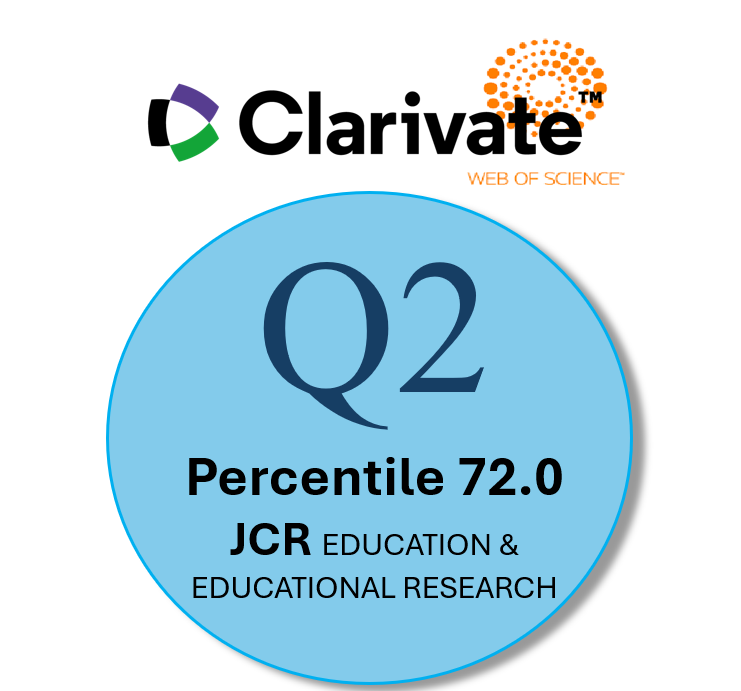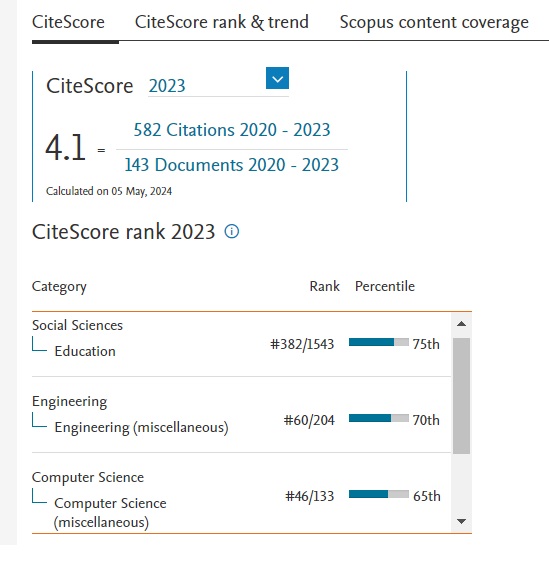El cambio pedagógico en la docencia universitaria en los tiempos de Covid-19
Resumen
Antecedentes: La aparición del virus COVID-19 ha generado una de las mayores disrupciones mundiales de los sistemas educativos (entre otros) en generaciones Propósito: Este estudio examina el impacto de la inmersión involuntaria de profesores de la Universidad Hebrea en entornos de aprendizaje digital debido a la pandemia COVID-19 y su impacto en las prácticas pedagógicas, de los instructores universitarios durante esta crisis. Metodología / Enfoque: Nuestra investigación siguió un enfoque de métodos mixtos, combinando componentes cualitativos con cuantitativos. Nuestro presente estudio pone especial énfasis en los componentes cualitativos de la investigación. Resultados / Conclusiones: En nuestro trabajo analizamos el modelo de aceptación de tecnologías desarrollado por Venkatesh y colaboradores (modelo UTAUT), y lo enriquecemos con una tipología de aceptación del cambio pedagógico (TACP) que permite comprender la situación planteada y actuar en consecuencia. El estudio encontró que existes dos dimensiones en la disposición al cambio pedagógico genuino en los docentes universitarios: Una es su nivel de alfabetización digital antes de la crisis; la segunda es su concepción pedagógica de enseñanza. Implicaciones: Nuestro modelo se puede aplicar a diferentes situaciones de crisis y puede ser útil para la formación y desarrollo del profesorado universitario en el campo de la alfabetización digital.
Descargas
-
Resumen1993
-
PDF1414
Citas
Admiraal, W., Louws, M., Lockhorst, D., Paas, T., Buynsters, M., Cviko, A., . . . Post, L. (2017). Teachers in school-based technology innovations: A typology of their beliefs on teaching and technology. Computers & Education, 114, 57-68.
Alenezi, A. (2017). Obstacles for teachers to integrate technology with instruction. Education and Information Technologies, 22(4), 1797-1816.
Bebell, D., & Kay, R. (2010). One to one computing: A summary of the quantitative results from the Berkshire wireless learning initiative. Journal of Technology, Learning, and Assessment, 9(2), n2.
Beetham, H., & Sharpe, R. (2007). Rethinking pedagogy for a digital age: Designing and delivering e-learning: Routledge.
Blau, I., & Peled, Y. (2012). [Chais] Teachers' Openness to Change and Attitudes towards ICT: Comparison of Laptop per Teacher and Laptop per Student Programs. Interdisciplinary Journal of E-Learning and Learning Objects, 8(1), 73-82.
Braun, V., & Clarke, V. (2012). Thematic analysis. In P. M. C. H. Cooper, D. L. Long, A. T. Panter, D. Rindskopf, & K. J. Sher (Ed.), APA handbook of research methods in psychology (Vol. 2, Research designs: Quantitative, qualitative, neuropsychological, and biological pp. 57-71). Washington, DC.
Brown, K. L. (2003). From teacher-centered to learner-centered curriculum: Improving learning in diverse classrooms. Education, 124(1), 49-55.
Creswell, J. W., & Clark, V. L. P. (2017). Designing and conducting mixed methods research. Thousand Oaks, CA: Sage Publications.
Davis, F. D. (1989). Technology Acceptance Model: TAM. Al-Suqri, MN, Al-Aufi, AS: Information Seeking Behavior and Technology Adoption, S, 205-219.
Dorfsman, M. (2018). El educador en línea: más allá de la digitalidad. RED. Revista de Educación a Distancia, 56.
Emaliana, I. (2017). Teacher-centered or student-centered learning approach to promote learning? JURNAL SOSIAL HUMANIORA (JSH), 10(2), 59-70.
Eshet-Alkalai, Y. (2004). Digital literaShlomo: A conceptual framework for survival skills in the digital era. Journal of Educational Multimedia and Hypermedia, 13(1), 93-106.
Fenstermacher, G. D., & Soltis, J. F. (2004). Approaches to teaching. New York: Teachers College Press.
Fishbein, M., & Ajzen, I. (2011). Predicting and changing behavior: The reasoned action approach: Taylor & Francis.
Fullan, M. (2002). El significado del cambio educativo: un cuarto de siglo de aprendizaje. Profesorado. Revista de currículum y formación de profesorado, 6(1-2), 1-14.
Graves, K. E., & Bowers, A. J. (2018). Toward a Typology of Technology-Using Teachers in the" New Digital Divide": A Latent Class Analysis of the NCES Fast Response Survey System Teachers' Use of Educational Technology in US Public Schools, 2009 (FRSS 95). Teachers College Record, 120(8).
Hodges, C., Moore, S., Lockee, B., Trust, T., & Bond, A. (2020). The difference between emergenShlomo remote teaching and online learning. Educause Review, 27, 1-12.
Kálmán, O., Tynjälä, P., & Skaniakos, T. (2020). Patterns of university teachers’ approaches to teaching, professional development and perceived departmental cultures. Teaching in Higher Education, 25(5), 595-614.
Kember, D., & Kwan, K.-P. (2000). Lecturers' approaches to teaching and their relationship to conceptions of good teaching. Instructional Science, 28(5), 469-490.
Kreijns, K., Vermeulen, M., Kirschner, P. A., Buuren, H. v., & Acker, F. V. (2013). Adopting the Integrative Model of Behaviour Prediction to explain teachers’ willingness to use ICT: a perspective for research on teachers’ ICT usage in pedagogical practices. Technology, Pedagogy and Education, 22(1), 55-71.
Le Fevre, D. M. (2014). Barriers to implementing pedagogical change: The role of teachers' perceptions of risk. Teaching and Teacher Education, 38, 56-64.
McLoughlin, C., & Lee, M. (2008). Mapping the digital terrain: New media and social software as catalysts for pedagogical change. Paper presented at the Ascilite Melbourne.
Murphy, M. P. (2020). COVID-19 and emergenShlomo eLearning: Consequences of the securitization of higher education for post-pandemic pedagogy. Contemporary Security PoliShlomo, 41(3), 1-14.
Schreurs, J., & Dumbraveanu, R. (2014). A shift from teacher centered to learner centered approach. International Journal of Engineering Pedagogy (iJEP), 4(3), 36-41.
Tarling, I., & Ng'ambi, D. (2016). Teachers pedagogical change framework: a diagnostic tool for changing teachers’ uses of emerging technologies. British Journal of Educational Technology, 47(3), 554-572.
Terhart, E. (2013). Teacher resistance against school reform: Reflecting an inconvenient truth. School Leadership & Management, 33(5), 486-500.
Venkatesh, V., & Bala, H. (2008). Technology Acceptance Model 3 and a research agenda on interventions. Decision sciences, 39(2), 273-315.
Venkatesh, V., & Davis, F. D. (2000). A theoretical extension of the Technology Acceptance Model: Four longitudinal field studies. Management Sciences, 46(2), 186-204.
Venkatesh, V., Morris, M. G., Davis, G. B., & Davis, F. D. (2003). User acceptance of information technology: Toward a unified view. MIS quarterly, 425-478.
Wood, E., Mueller, J., Willoughby, T., Specht, J., & Deyoung, T. (2005). Teachers’ perceptions: Barriers and supports to using technology in the classroom. Education, Communication & Information, 5(2), 183-206.
Yan, Z. (2020). Unprecedented pandemic, unprecedented shift, and unprecedented opportunity. Human Behavior and Emerging Technologies, 2(2), 110-112.
Derechos de autor 2021 Revista de Educación a Distancia (RED)

Esta obra está bajo una licencia internacional Creative Commons Atribución-NoComercial 4.0.
Las obras que se publican en esta revista están sujetas a los siguientes términos:
1. El Servicio de Publicaciones de la Universidad de Murcia (la editorial) conserva los derechos patrimoniales (copyright) de las obras publicadas, y favorece y permite la reutilización de las mismas bajo la licencia de uso indicada en el punto 2.
2. Las obras se publican en la edición electrónica de la revista bajo una licencia Creative Commons Reconocimiento-NoComercial-SinObraDerivada 3.0 España (texto legal). Se pueden copiar, usar, difundir, transmitir y exponer públicamente, siempre que: i) se cite la autoría y la fuente original de su publicación (revista, editorial y URL de la obra); ii) no se usen para fines comerciales; iii) se mencione la existencia y especificaciones de esta licencia de uso.
3. Condiciones de auto-archivo. Se permite y se anima a los autores a difundir electrónicamente las versiones pre-print (versión antes de ser evaluada) y/o post-print (versión evaluada y aceptada para su publicación) de sus obras antes de su publicación, ya que favorece su circulación y difusión más temprana y con ello un posible aumento en su citación y alcance entre la comunidad académica. Color RoMEO: verde.














